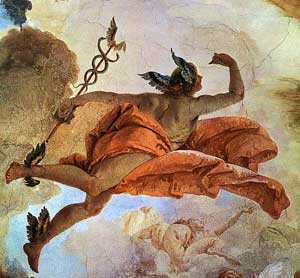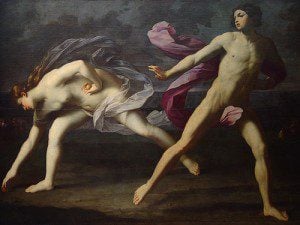 I don’t like to revisit topics generally. When I posted Running From the Word Pagan earlier this week I thought I had said everything I wanted to say in the public square. As the conversation progressed throughout the week, here and on other blogs such as Teo Bishop’s Bishop in the Grove and on Kenny Klein’s Tales of the Rambling Wren I began to realize that perhaps I wasn’t done. The last few nights I’ve been going to sleep with the “Don’t Call Me a Pagan” debate rambling around my little head. It’s January, I’m going to Vegas next week, I’ve got a hundred things to do before PantheaCon, the NFL Playoffs are on, and this examination of words is where my focus currently is.
I don’t like to revisit topics generally. When I posted Running From the Word Pagan earlier this week I thought I had said everything I wanted to say in the public square. As the conversation progressed throughout the week, here and on other blogs such as Teo Bishop’s Bishop in the Grove and on Kenny Klein’s Tales of the Rambling Wren I began to realize that perhaps I wasn’t done. The last few nights I’ve been going to sleep with the “Don’t Call Me a Pagan” debate rambling around my little head. It’s January, I’m going to Vegas next week, I’ve got a hundred things to do before PantheaCon, the NFL Playoffs are on, and this examination of words is where my focus currently is.
One of the things that surprised me earlier this week was how offended some people got when I admitted that I think of them as a part of “The Pagan Community,” while they disavow the word “Pagan.” It’s not my intention to offend. To me Pagan is a good word, and I tend to apply it to people who interact with me on Pagan forums, and at Pagan events, and on Pagan blogs. That doesn’t mean I lack respect for your religious choice, it’s just that I’m interacting with you in a place that has been labeled “Pagan” so I think of you as a part of that community.
I’ll admit that I suffer from “Big Tent Syndrome,” in that I want everyone that I like and/or find interesting to sit with me under the same giant piece of canvas. My Pagan experience has always been so broad that it has encompassed several different groups, styles of working, and perceptions of deity. Through all of those differences I have always found similar kinds of language, experience, and reflection. I can walk into most any kind of ritual setting labeled “Contemporary Pagan” by a majority of scholars and follow along and understand what is happening. I’ll also generally see similarities between my chosen path, British Traditional Witchcraft, and whatever else is going on around me.
What always surprises me the most in the discussion over separation from the word Pagan is how the majority of folks who spar over it prefer to call themselves polytheists. For the record, I’m a polytheist, my wife is a polytheist, and most of those I practice with are polytheists. We are still the rule within Paganism, and not the exception. Yup, there are a growing number of Humanist Pagans out there, but they generally use the language of polytheism in their rituals. During ritual the differences between us always appear slight, while drinking wine and conversing afterwards they certainly get larger, but I still feel a kinship with them.
 Many of the best Pagans I know have always crossed boundaries. These are folks who have been initiated into several different traditions, and also do Reconstructionist work. When I brought this up yesterday I was met with the accusation that if someone does eclectic Pagan Ritual they were probably too stupid to write (or participate in) an authentic Hellenic rite. After yelling at my computer for a few minutes I left the conversation. Ancient pagans most certainly participated in various rituals and demonstrations of devotion and piety. In the Roman empire one could worship at the Temple of Isis and then visit a grotto devoted to the god Pan. Why can’t I do that now?
Many of the best Pagans I know have always crossed boundaries. These are folks who have been initiated into several different traditions, and also do Reconstructionist work. When I brought this up yesterday I was met with the accusation that if someone does eclectic Pagan Ritual they were probably too stupid to write (or participate in) an authentic Hellenic rite. After yelling at my computer for a few minutes I left the conversation. Ancient pagans most certainly participated in various rituals and demonstrations of devotion and piety. In the Roman empire one could worship at the Temple of Isis and then visit a grotto devoted to the god Pan. Why can’t I do that now?
Most disturbing are people who label those who use the word Pagan as somehow less thoughtful or intelligent. Issac Bonewits was one of the smartest people I’ve ever had a conversation with and he wore the mantle of Pagan proudly. Many of the sharpest people I know use the term Pagan to describe their community or practice. I’ve admitted the short-comings of the word on several occasions, but choosing to use or not use the word Pagan doesn’t make someone smarter or more sophisticated. It makes you like everyone else, we are all trying to define ourselves and our relationship to the universe and or a higher power.
My friend Kenny Klein wrote something the other day that really bothered me. He wrote:
And here we are in the present. As my blogs here and the responses to them have shown, there is a huge effort to make Pagan mean pretty much anything. Pagans worship Jesus, Pagans believe in Gods from The Hobbit, Pagans are atheistic, Pagans are Pagan because they own a drum.
Kenny and I have a great relationship, and if you are in the Bay Area this February you can listen to us argue talk about many a Pagan thing at PantheaCon. Perhaps we’ll talk about this because I took great exception to it.
There certainly can be Pagans who worship Jesus. Looking at Jesus/Mary/Yahweh as just members of another religious pantheon should certainly be acceptable. I don’t personally understand it, but is there some sort of litmus test for determing which gods are OK and which aren’t in relation to someone’s personal Pagan practice? That doesn’t seem very Pagan to me at all. I have yet to encounter anyone who believes in gods from The Hobbit, but if I did, so what? Tolkien wasn’t only trying to craft a good story, he was also trying to create an English Mythology. Who is to say that he wasn’t channeling a mythos that had yet to be documented?
The atheist Pagan argument is an interesting one, but I’m not sure such battles over the reality of deity are unique to Paganism. There are Christians who go to church and look at the New Testament as a compass, but don’t literally believe in Jesus as the “Son of God.” Atheism is a philosophy I’ve never embraced, but as long as people want to join me in ritual and use a language similar to mine I’m fine with it. Doctrinal purity is an issue for monotheistic faiths, it’s not my place to say what’s right or wrong, real or not real*.
On that note, why can’t someone who simply owns “a drum” be Pagan? If they are going to Pagan festivals and drumming they are engaging in Pagan Culture. Drummers often exist in a trance-like state while drumming around a bonfire, who is to say that state doesn’t bring them closer to the divine? My wife belly-dances to express her faith and feel close to her gods, I have to believe that happens when someone drums, even if those are deities are nameless to the individual.
If the various sects and beliefs that currently make up “Modern Paganism” continue to grow and develop their own traditions I have no doubt that there will eventually be some separation from the tree. Wicca will become its own thing, the various Reconstructionist groups will go their own ways, etc. Perhaps it’s already beginning (and the fact that we are having this conversation implies that it might be) but I’ll be sad when it happens. I like walking in various worlds with various pagan gods, and even with those who “just drum.” When I say that all of those different threads are part of a broader community it’s only done with love and respect.
*Certainly specific traditions within Paganism can dictate what is and what is not acceptable. Kenny is one of the founders of the Blue Star tradition, and using Jesus in the specific context of a Blue Star Ritual would be frowned upon, much like praying to the Virgin Mary would be frowned upon in a Baptist Church. There are things that are and are not acceptable within certain traditions, I’m not arguing against that.
















